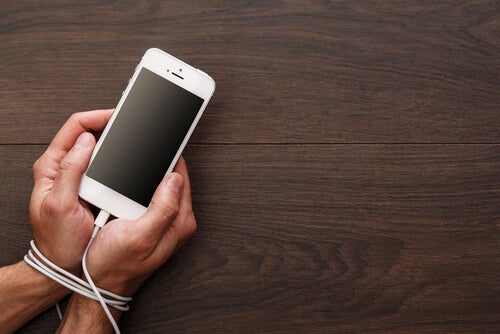The Role of Appearance on Social Networks

People are currently obsessed about their appearance on social networks. In fact, many people live their lives around it. For instance, how many times have you taken pictures just to post them on Facebook and Instagram? Admit it, your cell phone is a part of you. Thanks to them you can relate your “fabulous” daily activities so that others can admire you and reward you with their “likes”.
But what’s behind this incessant search for attention and admiration? Is it a fast way to gain notoriety? Could you point out any weaknesses in the self-esteem of these kinds of individuals? It’s a phenomenon that requires at least a little reflection, no doubt. The goal is to consider that there may be a degree of emotional deficiency. Appearance on social networks is now a subject of much debate at both a popular and scientific level. Continue reading to find out more about it.
“Joy is not in things; it is in us.”
-Richard Wagner-
Social networks and self-esteem
These platforms are mere tools and can be very useful both at a professional and personal level. On one hand, they help you be closer to your loved ones and share your experiences with them. You can post a photo of a special moment, write a reflection, share the music that you like, and even debate about any topic. On the other hand, you could also use it as an advertising platform for your company, for freelance work, and for any emerging projects you might be planning.
The problem is that, when you make appearance on social media the center of your life, it becomes your primary motivation. People no longer photograph what they come across but seek places and opportunities just for the purpose of taking selfies. Many of them also dress up just to show a picture of it to the world. Many live to do things just for show. In fact, some people have even lost their lives after they fell from the top of buildings after trying to get a “perfect selfie”.

What leads a person to pursue a social media lifestyle? It’s all about self-esteem, according to Massó (2013), as it’s related to your assessment of yourself. There are two components to it:
- Your self-concept is the consciousness you have about yourself. It’s the collection of characteristics that comprise your identity, qualities, and the characteristics of your way of being.
- The second component is sentimentality. This consists of the appreciation and love you have towards yourself, your interests, beliefs, values, and ways of thinking.
Low self-esteem influences how you relate to others. The López-Villaseñor team (2014) claims that people with low self-esteem live with anxiety and fear of rejection, which impairs their social relationships. This is a key point in understanding the obsessive use of social networks. Low self-esteem and fear of rejection translate, in many cases, into an urgent need to seek acceptance from others.
Appearance on social networks – filling an internal void
Buddhist psychology postulates the search to fill an inner void. In many cases, people seek happiness in external stimuli when they feel incomplete and frustrated at the same time. Thus, they look for attention and recognition and base their false sense of happiness on external opinions.
This type of happiness is fragile due to their desire to please and fit in, among other things. It strips a person of their own identity in many instances. They may receive criticism or they may simply not like what they can offer. Thus, it damages their self-esteem even further and they become even more resentful.
Another influencing factor is the volatility of common opinion. People may like something today and dislike it tomorrow. Thus, having many followers one day isn’t synonymous with being popular the day after. Why, though? It may be that you’ve placed your happiness in the hands of others instead of being responsible for it. Although you may not know it, your happiness depends entirely on you.

Final reflection
Not all that glitters is gold. In other words, what you see on social networks isn’t a reflection of reality. This is because people are highly selective about what they want you to see. As you can imagine, appearance on social networks is relative. For example, nobody usually hangs up photos of them crying or having a hard time. Go ahead and look closely, most of what you see are trips, parties, or events. “Look what I’ve achieved, where I’ve been, or how much fun I’m having.” Thus, don’t make the mistake of thinking that other people live a glamorous life.
Phrases such as “Oh, what a good time my friend is having” or “My friend is always doing fun things” are very common these days. However, if you actually were there with them, you’d surely discover their lives aren’t as different as yours. They too have many moments of sadness and joy. What this means is that you shouldn’t believe everything you see on their walls. However, be happy for them if they’re truly happy.
To conclude, we need to emphasize that your happiness is in your hands alone. Thus, don’t base it on other people’s opinions. Similarly, don’t take their social network profiles as an inspiration for yours, as it’s a rather biased showcase. This is because it’s a world where negative emotions don’t exist and, therefore, little to nothing is real.
This text is provided for informational purposes only and does not replace consultation with a professional. If in doubt, consult your specialist.








